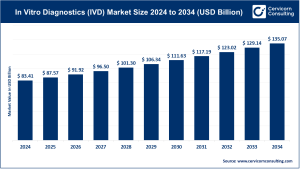Market Overview
The global medical affairs outsourcing market is on a strong growth trajectory, driven by the rising complexity of modern therapies, an expanding regulatory landscape, and the growing need for life science companies to streamline operations and focus on core competencies. The market was valued at USD 2.34 billion in 2024 and is projected to reach USD 6.48 billion by 2034, registering a healthy CAGR of 10.72% between 2025 and 2034.
Key service categories include medical communications, medical information, regulatory and compliance support, clinical trial assistance, and pharmacovigilance and safety services. The market is dominated by therapeutic segments such as oncology, cardiology, neurology, infectious diseases, and rare disorders. In 2024, North America accounted for nearly 38% of the total market, followed by Asia-Pacific (31%), Europe (20%), and LAMEA (10%).
Get a Free Sample: https://www.cervicornconsulting.com/sample/2788
Key Market Trends
- Adoption of AI and Digital Transformation
Leading outsourcing providers are increasingly leveraging artificial intelligence, automation, and data analytics to optimize medical affairs functions. AI tools support faster content generation, enhance data-driven decision-making, and ensure regulatory compliance through real-time monitoring. - Growing Complexity in Therapeutics
The surge in biologics, cell and gene therapies, and personalized medicine has heightened the need for specialized expertise. Oncology remains the leading therapeutic area, accounting for over 40% of market share in 2024, highlighting the critical role of outsourcing partners with advanced technical and regulatory knowledge. - Shift Toward Patient-Centric and RWE Models
With healthcare moving toward patient-centric models, real-world evidence (RWE) generation has become vital. Outsourced partners are now involved in patient engagement, field medical liaison activities, and post-market surveillance—helping clients create more personalized, data-driven care strategies. - Expanding Regulatory Complexity
As global regulatory frameworks become more diverse and dynamic, pharmaceutical firms are turning to outsourcing for managing regulatory writing, pharmacovigilance, and submission documentation. This approach reduces internal workload and ensures rapid compliance with international standards. - Regional Diversification and Emerging Market Expansion
Emerging markets such as India, Brazil, and Indonesia are evolving as attractive outsourcing destinations due to cost efficiencies and a growing base of skilled professionals. Providers are establishing local hubs to deliver region-specific, multilingual, and regulatory-aligned services.
Market Drivers
- Rising Demand for Specialized Expertise
Pharma and biotech companies outsource medical affairs functions to access niche scientific and regulatory skills while focusing on innovation and market expansion. - Expanding R&D Pipelines and Investments
With increased R&D spending and more complex clinical pipelines, outsourcing helps manage medical writing, regulatory documentation, and evidence management efficiently. - Technological Advancements
Integration of digital tools, AI, and analytics enhances productivity, improves accuracy, and reduces turnaround time, making outsourcing more appealing for scalability and innovation. - Globalization of Clinical Development
As clinical operations become more globalized, companies require partners with international presence and local regulatory expertise to maintain consistent compliance and accelerate approvals. - Emphasis on Real-World Evidence and Patient Outcomes
Growing dependence on RWE and patient data has led to demand for partners proficient in advanced analytics and digital patient engagement solutions.
Impact of Trends and Drivers
- Service Segments: Medical communications led the market with nearly 38% share in 2024, fueled by rising demand for digital content, regulatory writing, and medical visualization. Pharmacovigilance and compliance support services are also expanding rapidly.
- Therapeutic Areas: Oncology continues to dominate, while rare diseases and advanced therapies represent emerging growth niches.
- Regions: North America remains the largest market, while Asia-Pacific is projected to record the fastest growth due to cost advantages and increased clinical research investments. Europe and LAMEA are also showing strong momentum with regulatory modernization.
- End Users: Pharmaceutical firms remain the largest client base, followed by biotech companies and contract research organizations (CROs). Hospitals and healthcare providers are also becoming active participants through decentralized and hybrid clinical models.
Challenges and Opportunities
Challenges
- Limited availability of skilled regulatory and medical professionals
- Data privacy and security risks in outsourced operations
- Maintaining consistent quality across regions
- Heightened price competition among providers
Opportunities
- Expanding opportunities in underrepresented therapeutic areas like rare and genetic disorders
- Growth of real-world evidence and digital engagement platforms
- Adoption of AI-powered automation in compliance and medical writing
- Emergence of new regional outsourcing hubs supporting global operations
Future Outlook
The medical affairs outsourcing market is poised for sustained expansion, expected to reach USD 6.48 billion by 2034 at a CAGR of 10.72%. Asia-Pacific will likely emerge as the fastest-growing region, backed by expanding clinical research ecosystems and a highly skilled workforce.
Digital transformation, artificial intelligence, and integrated service delivery will continue to shape the industry’s future. Providers that offer comprehensive, technology-enabled solutions combining scientific, regulatory, and communication expertise are expected to lead market growth.
As innovation accelerates and global regulations become more stringent, outsourcing will remain a strategic pillar for pharmaceutical and biotechnology companies—ensuring efficiency, compliance, and speed in an increasingly complex healthcare environment.
For a detailed market analysis and forecast, visit: Cervicorn Consulting


